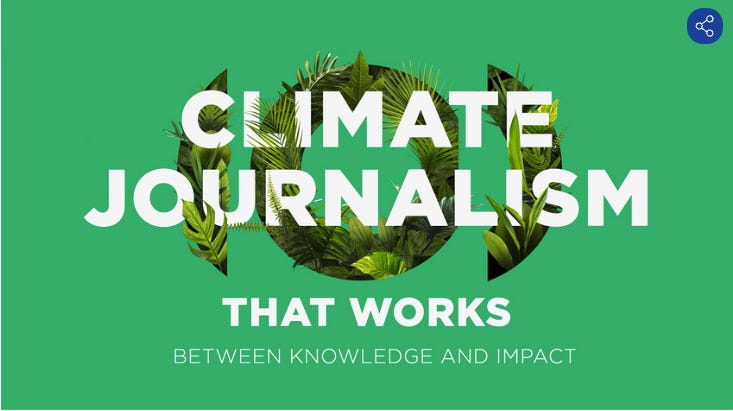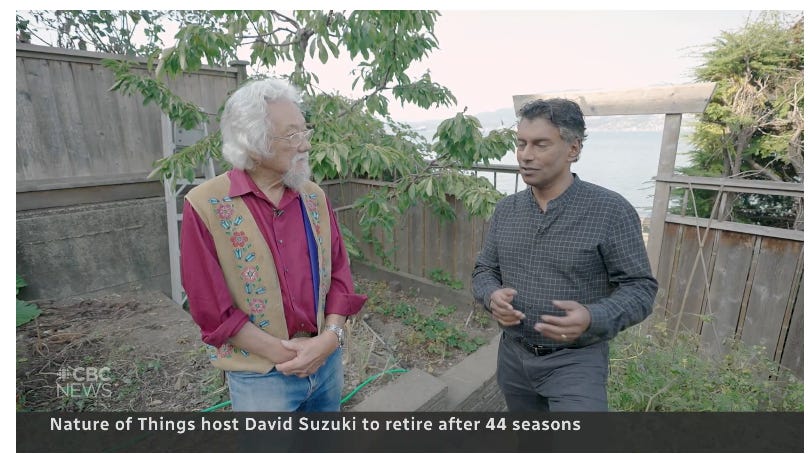Your Canadian climate journalism newsletter #4: A poll, a graphite mine and someone who truly speaks his mind
November 5, 2022
🍃This newsletter is 935 words long, a 7-minute read.🍃
Human activity causes climate change: Science is very clear about that, but only 68% of Canadians agree, writes Mia Rabson, Energy and Environment reporter for The Canadian Press. She was reporting on a poll conducted during Thanksgiving weekend to which 1500 Canadians responded. People living in regions recently affected by extreme weather events, such as the Atlantic provinces and British Columbia, were more concerned.
It's 23 degrees on November 5 as I write those lines. My kids wear sandals. Environment Canada said the warm temperature in October was record-breaking in many cities across the country. But our media thermometer is not overheating. After a timid progression in September, while global climate strikes happened, the media’s interest for the climate was back to its [low] normal. We added many media to our watch list, for a total of 39, and 0.45% of their tweets mentioned the climate in the past month. We expect an important rise of interest in November, with the unfolding of COP27 in Egypt and the preparation of Montreal to the venue of the COP15, the United Nations Biodiversity Conference, in December. The talk of the town so far? Security and… traffic jams.
Justin Trudeau has chosen not to attend the COP27. Environment and Climate Change Minister Steven Guilbeault has been tasked to lead the Canadian delegation instead. What's on the agenda? Valerie Volcovici, with Reuters, brings you the talking points you don't want to miss.
For the reporters out there, Covering Climate Now published a COP27 guide.
Thanks to our growing number of readers!
Amélie
News
QUEBEC | ALBERTA : The Legault and Smith governments - What will happen with the environmental file?
While Quebec just gave a second mandate to François Legault’s CAQ, Danielle Smith becomes Alberta’s Premier, as the new leader of the United Conservative Party. What does this portend for the future of climate action in the two provinces? That's what journalists Alexis Riopel and Drew Anderson try to clarify in these stories from Le Devoir (Quebec) and The Narwhal (Alberta).
More than just soup on a painting
Hard to miss was the story about the climate activists that poured tomato soup on Vincent Van Gogh’s painting in London a few weeks ago. But few did as well a job as CTV’s Alexandra Mae Jones, who explains why this action was taken.
Indigenous news
First Nation to rebuild climate research station ravaged by late-season wildfire
Mid-October, a climate research station was ravaged by an unusually late forest fire in the Northwest Territories. In the face of this climate change anomaly, one can only be struck by the irony of the situation. In addition to representing a significant loss to the local population and the scientific community at large, the decimation of Scotty Creek also marks the destruction of one of the first research stations in the world to be run by members of an Indigenous community. Check out this in-depth article published by CBC News to learn why the Łı́ı́dlı̨ı̨ Kų́ę́ First Nation is so keen to rebuild the station.
Research
A glimpse of the upcoming report, “Climate Journalism That Works – Between Knowledge and Impact.” It’s to be released in 2023. Researcher Alexandra Borchardt shares some key preliminary findings here, such as More facts don’t help.
Longform
How a Quebec graphite mine is dividing a community’s support for the EV revolution
We could not avoid sharing this detailed article from The Globe and Mail about the Matawinie graphite mine in Lanaudière, Quebec. Neal Rockwell's writing and photography work are particularly noteworthy. But why should we care about this mining project in the context of climate change? That’s because it's an important piece for both Ottawa and Quebec to make Canada a manufacturing hub for rechargeable lithium batteries needed for the electric vehicle revolution. However, like any mining project, the Matawinie project is not unanimously supported by the local community. Some residents fear that the mine will not be as "clean" as it claims. Others are convinced that it would be crazy to pass on the (potential) economic benefits of this project.
(Non)Solution
Sometimes solutions don’t work out the way they were meant to
While we usually mention stories that show great and innovative solutions to climate issues, we think it’s also important to acknowledge that these ideas don’t always go to plan. A community in Ottawa saw one of these climate action projects fail, with a large parking lot built to help commuters use public transit be nearly desolate regardless of the time of day. You can read more about the lacklustre results of the parking lot in the CBC article here.
Podcast
If you have an appetite for a short, easy-to-listen podcast episode, then we recommend CBC’s What On Earth. The host sat down with the first director of Environment and Climate Change Canada’s new division of Indigenous Science, Myrle Ballard. The five-minute episode discusses what Indigenous science is and how it is being implemented in the Canadian government.
Profile
“I don’t give a s* what people think about me.”
Screenshot: CBC
If you have only one story to watch from this past month, we recommend this Ian Hanomansing interview with David Suzuki. After 44 years as the host of the show The Nature of Things, Suzuki will be retiring when the next season, to be launched in January 2023, ends. And he speaks his mind.
"Overall I feel like a failure, being part of a movement that has failed," he said. "All I want is to be able to say to my grandchildren, 'I did the best I could."
This week’s newsletter was written by Brianna Losinger-Ross and Mélanie Lussier. Editor in chief: Léa Beaulieu-Kratchanov. Editor: Amélie Daoust-Boisvert
The Climate and the Media in Canada newsletter is a monthly publication brought to you by Concordia Journalism assistant professor Amélie Daoust-Boisvert and her team. It’s made possible because of support from the Social Sciences and Humanities Research Council (SSHRC). Questions, feedback? Reach out at cmrconcordia@gmail.com
You are receiving this because you are on our mailing list.
You can update your preferences or unsubscribe from this list: Do you want to help us? Share this newsletter with anyone curious about climate change and its media coverage in Canada, or tweet about it.
And if you’re not a subscriber yet, join our mailing list here.





